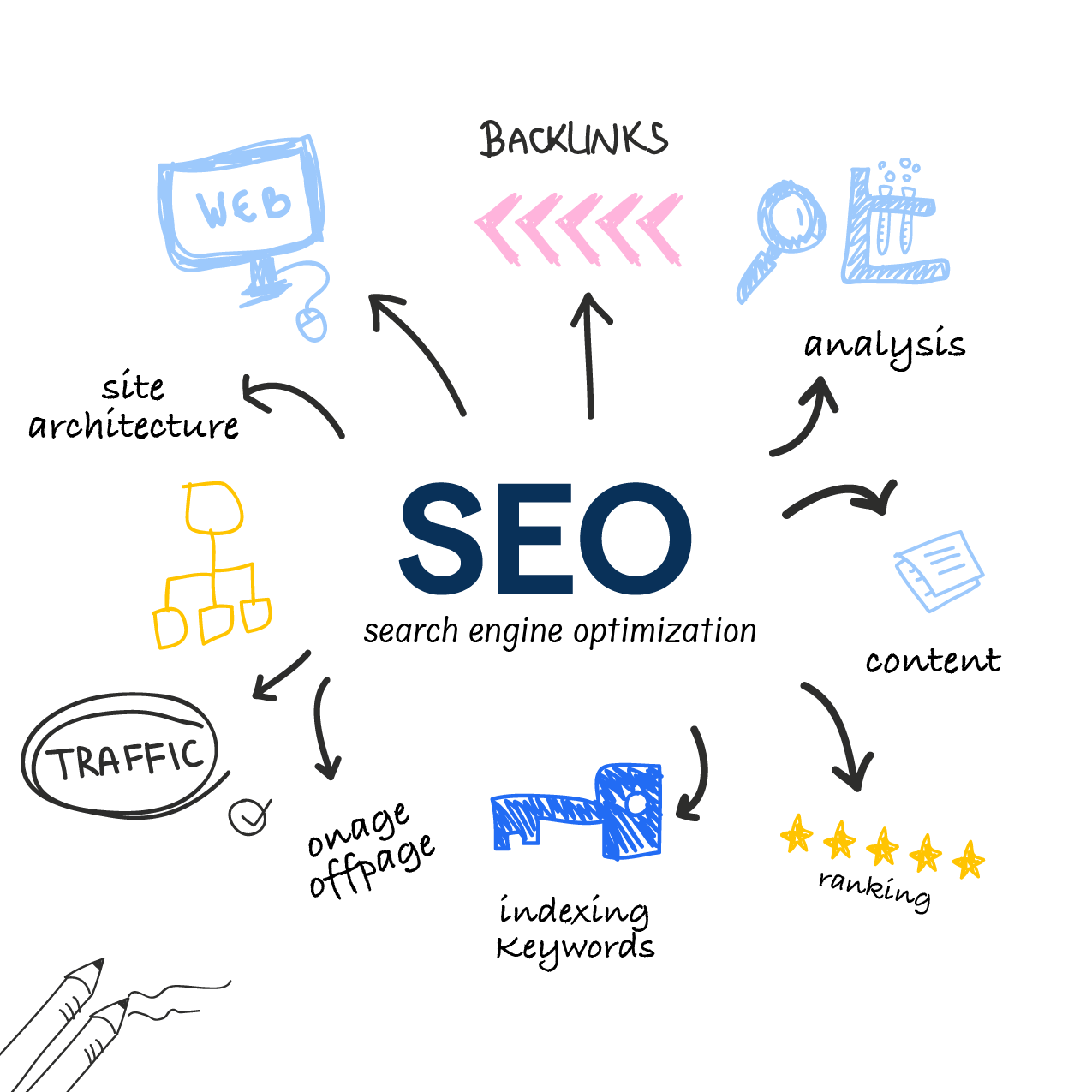DIY SEO Strategies to Boost Your Online Presence

Are you struggling to improve your website’s visibility and organic search ranking? Look no further than DIY SEO strategies! By implementing website optimization techniques, you can attract a wider audience, drive more traffic to your site, and improve your online presence.
DIY SEO allows you to take control of your website’s optimization and tailor it to your unique needs. With a little knowledge and effort, you can make significant progress towards achieving your SEO goals.
Key Takeaways:
- DIY SEO can help you improve your website’s visibility and organic search ranking
- Website optimization techniques can attract a wider audience and drive more traffic to your site
- Implementing targeted keywords and optimizing website structure are essential components of DIY SEO
- Consistent monitoring and analysis of your SEO efforts can help you stay up-to-date with the latest trends and updates
- Remember to create high-quality content and focus on building high-quality backlinks to improve your organic search ranking.
Understanding the Basics of SEO
Before diving into DIY SEO strategies, you need to understand the basics of search engine optimization. SEO is the practice of optimizing your website to increase its visibility and rank higher in search engine results pages (SERPs).
On-Page SEO Techniques
On-page SEO refers to the optimization of the content and structure of your website’s individual pages to improve their relevance to particular search queries. Here are some on-page SEO tips to keep in mind:
- Include relevant keywords in your content, meta tags, and headings.
- Ensure your website has a clear structure and clean code.
- Optimize your images with descriptive alt tags and compressed file sizes for faster loading speeds.
Off-Page SEO Tactics
Off-page SEO includes all the optimization techniques that you use outside of your website to improve its ranking in search engine results. Here are some off-page SEO tactics to keep in mind:
- Get high-quality backlinks from relevant and authoritative websites.
- Create engaging content that is shareable and promotes backlinks on social media and other platforms.
- Participate in guest blogging, influencer outreach, and other content promotion strategies.
Conducting Keyword Research
Keywords are the foundation of any successful SEO strategy. Conducting proper keyword research is essential for finding the right terms and phrases to target in your content. This process involves using keyword research tools, analyzing search volume, and examining your competition to find relevant terms that align with your website’s goals.
When conducting keyword research, consider both short-tail keywords, which are brief and generic, and long-tail keywords, which are more specific and less competitive. By incorporating a mix of both types of keywords, you can target a broader audience while also catering to more specific search queries.
Using Keyword Research Tools
Keyword research tools, such as Google Keyword Planner and SEMrush, provide valuable insights into the search volume and competition for specific keywords. These tools allow you to see how often a keyword is searched and compare its popularity to other keywords, giving you an idea of which terms are worth targeting.
When using keyword research tools, look for keywords that have a high search volume and low competition. These are typically the terms that will be most beneficial to target in your content.
Analyzing Your Competition
Examine the content and keyword strategies of your competition to identify keywords and phrases that may be worth targeting. Look for high-ranking pages and see which keywords they are using in their content, headings, and meta tags.
While it’s essential to learn from your competition, avoid copying their strategy outright. Instead, find ways to differentiate your content and target keywords that they may not be focusing on.
A well-organized website structure and user-friendly navigation are critical components of effective website optimization techniques. By optimizing your website’s structure and navigation, you can help search engines understand your site’s content and improve its overall visibility.
Proper URL Structure
The URL structure of your website is essential for search engines to understand your site’s content and its hierarchy. Use descriptive URLs that include relevant keywords and phrases to help search engines crawl and index your content more effectively.
User-friendly navigation helps your visitors quickly and easily find the information they are looking for on your website. Consider implementing a clear and well-structured menu with dropdowns to make it easy for your visitors to navigate your site.
Sitemaps
A sitemap is a file that lists all the pages on your website and provides additional information about each page’s content. Sitemaps help search engines understand your site’s structure and find all your content more efficiently.
Creating High-Quality Content
When it comes to SEO, content is king. It’s not only essential for attracting visitors to your website but also for improving your search engine rankings. Therefore, it’s crucial to put extra effort into creating high-quality, engaging content.
To ensure your content is effective, you need to optimize it for search engines. To do this, start by conducting keyword research and incorporating relevant keywords into your content. This will help search engines recognize the relevance and value of your content.
It’s also crucial to prioritize the user experience by crafting engaging, well-written content that keeps visitors on your site. This means avoiding generic, irrelevant content and instead offering unique perspectives, insights, and advice.
Content Optimization Techniques
To further optimize your content, consider implementing the following techniques:
- Meta descriptions: Write concise, compelling meta descriptions for each page on your website that summarize the content and include relevant keywords.
- Headings: Use headings (h1, h2, h3) to organize your content and make it easier for readers to navigate.
- Alt tags: Include alt tags for all images on your website, using relevant keywords to describe the image.
- Internal links: Include internal links throughout your content to other relevant pages on your website.
- Readable format: Break up your content with shorter paragraphs, bullet points, numbered lists, and other formatting techniques that make it easier to read.
Examples of High-Quality Content
Here are some examples of high-quality content that can help improve your website’s search engine rankings:
“5 Tips for Creating Engaging Social Media Posts”
From: Hootsuite
This blog post from Hootsuite provides actionable tips for creating engaging social media posts that grab users’ attention and drive engagement.
“The 10 Dos And Don’ts Of Using Social Media For Business”
From: Forbes
This article from Forbes offers insights into how to use social media effectively for business, including dos and don’ts for different platforms.
Optimizing Your Website’s Loading Speed
When it comes to optimizing your website for search engines, website loading speed is a crucial factor. A faster website means better user experience, increased engagement, and lower bounce rates, all of which can significantly improve search engine rankings.
To improve your website’s loading speed, consider implementing the following website optimization techniques:
1. Image Compression
Large images can significantly slow down website loading speed. To solve this problem, you can use image compression tools that reduce the size of your images without compromising their quality. This technique allows your website to load faster, resulting in a better user experience.
2. Browser Caching
Browser caching allows your website to store data in a visitor’s browser, reducing the time it takes to load your website on repeat visits. By enabling browser caching, you can significantly improve your website’s loading speed and, ultimately, your search engine rankings.
3. Minimize HTTP Requests
HTTP requests occur when a web page loads, and it requests all the necessary files to display the content. The more HTTP requests, the slower your website will load. To minimize HTTP requests, you can simplify your website’s design, optimize code, and reduce the number of images and other media used.
By implementing these easy website optimization techniques, you can significantly enhance your website’s loading speed, user experience, and search engine rankings. A faster website will lead to better engagement and more conversions, resulting in a more successful online presence.
Building High-Quality Backlinks
Backlinks are an important factor in improving your website’s search visibility, and learning backlink building strategies can help your site rank higher in search engine results. High-quality backlinks from trusted and relevant sources are more valuable than getting a lot of backlinks from low-quality websites. Here are some effective strategies to help you build high-quality backlinks:
GUEST BLOGGING
Guest blogging
is a popular strategy for building backlinks by creating quality content for other websites in your niche and linking back to your website. This helps you generate brand awareness and build relationships with other bloggers and industry leaders.
INFLUENCER OUTREACH
Look for influencers or bloggers in your niche who have a large following and can help you promote your content. You can connect with them by reaching out and asking if they would be interested in collaborating on a piece of content. Influencer outreach is effective in building high-quality backlinks and driving traffic to your website.
CONTENT PROMOTION
Creating quality content that can be promoted across different channels, such as social media, email marketing, and online forums, can help you get more visibility and attract more backlinks. Promote your content to relevant websites and social media platforms to increase your chances of building high-quality backlinks.
| DO | DON’T |
|---|---|
| Target high-authority websites with a good domain rating | Focus only on the number of backlinks you get |
| Create high-quality content that provides value to your audience | Use spammy or irrelevant anchor texts to link back to your website |
| Build relationships with other bloggers and influencers in your niche | Buy backlinks or use any black hat SEO techniques |
By following these backlink building strategies, you can increase the number of high-quality backlinks to your website and improve your search visibility. Remember to focus on creating quality content and building relationships with other bloggers and industry leaders in your niche to attract more backlinks and help your website rank higher in search engine results.
Harnessing the Power of Social Media
Social media platforms such as Facebook, Twitter, and Instagram provide fantastic opportunities to increase your website’s visibility and drive more traffic to your site. By optimizing your social media profiles, you can improve your SEO efforts and attract a larger audience.
Here are a few social media optimization tips to get you started:
Create Engaging Profiles
Your social media profiles are an extension of your brand, so it’s essential to make them as engaging and informative as possible. Use high-quality profile and cover photos, write a compelling bio, and include a link to your website.
Engage with Your Audience
Social media is an excellent tool for building relationships with your audience. Respond to comments, messages, and mentions promptly and engage with your followers by asking for feedback and starting conversations.
Leverage Social Sharing
Social sharing can significantly impact your website’s visibility and improve your search engine rankings. Encourage your followers to share your content on their social media profiles, and make it easy for them to do so by including social sharing buttons on your website.
“Social media allows us to behave in ways that we are hardwired for in the first place – as humans. We can get frank recommendations from other humans instead of from faceless companies.” – Francois Gossieaux, social media expert
With these social media optimization techniques, you can quickly and easily enhance your website’s visibility and attract more traffic. Start harnessing the power of social media today!
Optimizing for Local Search
As a local business, optimizing for local search results can make or break your online success. To improve your visibility, you should start with the basics and utilize local keywords that your potential customers may use in their searches.
Next, claim and optimize your Google My Business listing, providing your business’s essential information such as contact details, address, opening hours, and reviews. This listing can significantly improve your visibility in local search results, providing your business with a powerful online presence in the community.
Customer reviews are also essential for your local search visibility. Encourage satisfied customers to write positive reviews, respond to negative feedback, and engage with your audience in online forums. Their feedback and involvement can significantly impact your online reputation and build a loyal customer base.
“In a crowded online marketplace, optimizing for local search is vital to help you stand out, attract the right customers, and grow your business.”
Monitoring and Analyzing Your DIY SEO Strategies
After implementing your DIY SEO strategies, it’s crucial to monitor your website’s performance to ensure their effectiveness and make data-driven decisions to improve your SEO efforts.
Using web analytics tools like Google Analytics, you can track website traffic, bounce rates, and user behavior. Analyzing keyword rankings using tools like SERPWatcher can help you identify which keywords drive the most traffic to your site and adjust your strategy accordingly.
Additionally, analyzing your competition’s SEO efforts through tools like Ahrefs can help you identify gaps in your strategy and opportunities for improvement.
Stay consistent in monitoring your progress and adapt to changes to achieve long-term SEO success. By regularly analyzing your DIY SEO efforts and adjusting your strategy, you can continually improve your website’s visibility and attract a larger audience.
Staying Up-to-Date with SEO Trends and Updates
As a savvy website owner, it’s important to stay current with the latest SEO trends and updates. SEO best practices change frequently, and algorithms are constantly being updated, so what worked yesterday may no longer be effective today. By regularly monitoring industry news and expert blogs, you can stay ahead of the curve and ensure your DIY SEO strategies remain effective.
One way to keep track of SEO trends is to subscribe to SEO newsletters and blogs. Some popular options include Search Engine Land, Search Engine Journal, and Moz Blog. These sources offer valuable insights into Google’s algorithms, SEO best practices, and tips for optimizing your website.
Another crucial element of staying up-to-date with SEO is to pay attention to algorithm updates. For example, Google’s recent BERT update made significant changes to how the search engine processes natural language queries. Keeping up with these updates is essential to ensure your content remains relevant and high-ranking.
In summary, staying up-to-date with SEO trends and updates is key to the success of your DIY SEO strategies. By regularly monitoring industry news and algorithm updates, you can ensure your website remains visible in organic search results and continues to attract the right audience.
Conclusion
In conclusion, implementing DIY SEO strategies can significantly boost your online presence and improve your website’s visibility in organic search results. By optimizing your website’s structure and navigation, creating high-quality content, building high-quality backlinks, and utilizing social media, you can drive more traffic and attract the right audience. It’s important to stay consistent, monitor your progress, and adapt to changes to achieve long-term SEO success.
Remember, SEO is a long-term game, and it takes time to see results. Don’t get discouraged if you don’t see immediate improvements. Keep implementing these website optimization techniques and monitoring your progress using web analytics tools.
Stay informed about the latest SEO trends and algorithm updates to ensure your DIY SEO strategies remain effective and aligned with best practices. Consider attending local SEO conferences or following industry experts on social media for the latest insights.
Start optimizing your website today and watch as you attract more traffic, improve your search engine rankings, and grow your online presence!
FAQ
What are DIY SEO strategies?
DIY SEO strategies refer to search engine optimization techniques that individuals can implement themselves without hiring professional help. These strategies aim to improve website visibility, increase organic search ranking, and attract a larger audience.
What are some on-page SEO techniques?
On-page SEO techniques involve optimizing elements on your web page to improve search engine visibility. Some common on-page SEO techniques include optimizing meta tags, headings, URL structure, and incorporating relevant keywords in your content.
What are off-page SEO tactics?
Off-page SEO tactics are strategies that focus on improving your website’s reputation and authority outside of your web pages. These tactics include building high-quality backlinks, guest blogging, influencer outreach, and content promotion on social media.
How can I conduct keyword research for my website?
Keyword research is an essential step in SEO. Use keyword research tools like Google Keyword Planner, SEMrush, or Moz to find relevant keywords for your website. Look for keywords with high search volume and low competition to increase your chances of ranking higher in search engine results.
A well-organized website structure and navigation can improve user experience and search engine crawling. Implement SEO-friendly practices like proper URL structure, XML sitemaps, and user-friendly navigation menus to make it easier for search engines to index your web pages.
How does high-quality content contribute to SEO?
High-quality content plays a crucial role in attracting visitors and improving search engine rankings. Create engaging, original, and relevant content that incorporates targeted keywords. This will help search engines understand the context of your web pages and increase your chances of ranking higher in search results.
How can I optimize my website’s loading speed?
Website loading speed is important for user experience and SEO. Optimize your website’s loading speed by compressing images, enabling browser caching, minifying CSS and JavaScript files, and reducing the number of HTTP requests. These techniques help your website load faster and improve search engine rankings.
How do backlinks impact SEO?
Backlinks from reputable and relevant websites are considered votes of confidence and can positively impact your website’s search visibility. Build high-quality backlinks through techniques like guest blogging, influencer outreach, and content promotion. This will improve your website’s authority and increase its chances of ranking higher in search engine results.
To optimize your social media profiles for SEO, ensure that your profiles are complete, accurate, and consistent across different platforms. Incorporate relevant keywords, engage with your audience, and encourage social sharing of your content. These practices can enhance your search visibility and drive more traffic to your website.
How can I optimize my website for local search?
If you have a local business, optimizing for local search is crucial. Include local keywords in your content, claim your Google My Business listing, and encourage customer reviews. These strategies will improve your visibility in local search results and help attract customers in your area.
How can I monitor and analyze my SEO efforts?
Use web analytics tools like Google Analytics to monitor your website’s performance, track keyword rankings, and analyze user behavior. By analyzing data and metrics, you can make data-driven decisions to continually improve your SEO strategies.
How can I stay up-to-date with SEO trends and updates?
The field of SEO is constantly evolving. Stay informed about the latest SEO trends and algorithm updates by following reputable SEO blogs and industry publications. Participate in online forums and communities to learn from other SEO professionals. Continuous learning and adaptation are key to remaining effective in your DIY SEO strategies.





